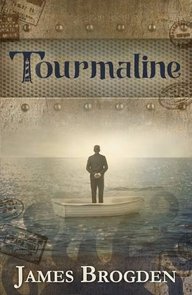
Brogden faces quite a challenge due to the success of his debut novel, The Narrows. He set the bar so high with his first publication and must now follow his own critically-acclaimed, accomplished piece of writing. As with any second novel, fans want to see everything they loved about The Narrows but they also demand something new and improved. As such, Tourmaline was set to be Brogden's difficult second album.
Suffice it to say, Brogden has made this second album look easy. Tourmaline is every bit as masterful as The Narrows. It is grounded, gripping fantasy, with strong elements of horror, plenty of dark humour and a cast of beautifully-realised characters.
If The Narrows was Brogden's Reservoir Dogs, then Tourmaline is his Pulp Fiction. Or, to use a literary reference, if The Narrows was Carrie, then Tourmaline is Salem's Lot: bigger, bolder and more ambitious.
The Stephen King reference is apt because Brogden shares the prolific storyteller's talent for inserting humour into the darkest of moments. There are many laughs to be had from the hradix, for example, which is essentially a reptilian monster stuck in the body of a child, who the heroes adopt as a pet halfway through the novel. Brogden also has King's flair for depicting scenes of utter horror. A scene where a swarm of floating bones and tendons attacks the heroes like ravenous wasps instantly springs to mind. And the monstrous araka is a fearsome creation, perfectly introduced in the opening prologue.
However, King-sceptics needs not fear. Brogden bypasses King's penchant for over-writing and Tourmaline is therefore a lean, mean, fast-paced and well-edited read. Equally, those not keen on fantasy should not be put off. Tourmaline is not high fantasy. There are no dragons and wizards. The story is grounded in reality, with recognisable characters, much like George R R Martin's work.
Indeed, half of the action is set in our everyday world. Brodgen takes the ingenious decision to adopt a dual narrative structure in the early chapters to ease newcomers into the idea of another world. We glimpse this new world a piece at a time: at first, it contains only one man lost at sea. Then, gradually, other characters are introduced in the form of a small crew on a scrap-ship. This softly-softly approach makes the reader comfortable in another universe so they won't even blink when Part Two arrives, set almost entirely in the other world.
Ironically, it is the action in the real world which is one of Tourmaline's greatest USPs and an author trademark that Brogden established in The Narrows. Specifically, the story takes place in Birmingham (UK), second largest city in England, jewel of the Midlands, home of the balti curry and a place with more canals than Venice and more parks than Paris. It is the perfect place to set a fantasy novel: large, diverse, cultural, modern but traditional and rough around the edges.
Locals to Birmingham can enjoy references to the Sea Life Centre, Hagley Road and the infamous Spaghetti Junction. Meanwhile, University of Birmingham students and alumni will be excited by the opening which is set in the campus-based Barber Institute of Fine Art. Even better, a University of Birmingham security guard saves the world. Now that's something to put in the 2015 prospectus.
The vast ensemble is brilliantly put together. Brogden skilfully captures the voices and personalities of dozens of characters, making us feel sympathetic to all of them, hero or villain. It is testament to the characterisation that the inhabitants in the fantasy world are just as relatable and recognisable as those in the real world. Brogden switches between their perspectives with admirable dexterity.
Brogden's talent for language is worth a special mention. With so much story, action and snappy dialogue, a lesser writer may have skimped on the poetry but this is not a luxury that fantasy writers can afford. After all, they have to build a new world in our mind's eye. Brogden accepts this mantle with relish. A ship encounters "a maze of beautiful but navigationally perilous coral reefs which rose into thousands of shimmering pillars, as if the microscopic creatures which built the coral had one day decided to build up towards heaven." The Birmingham locations get their own share of Brogden's poetic pen. Describing the Sea-Life Centre as echoing with the "shrieking of children, tinny ocean-themed muzak and the pervasive thunder of water" is one of many observations that will have local readers nodding.
Tourmaline is one of the finest books published last year: addictive, thrilling, fantastic, saturated with imagination and brimming with story. It deserves a long print-run, critical acknowledgement and commercial success, as does the talented James Brogden.
Tourmaline is available to order in paperback here.
